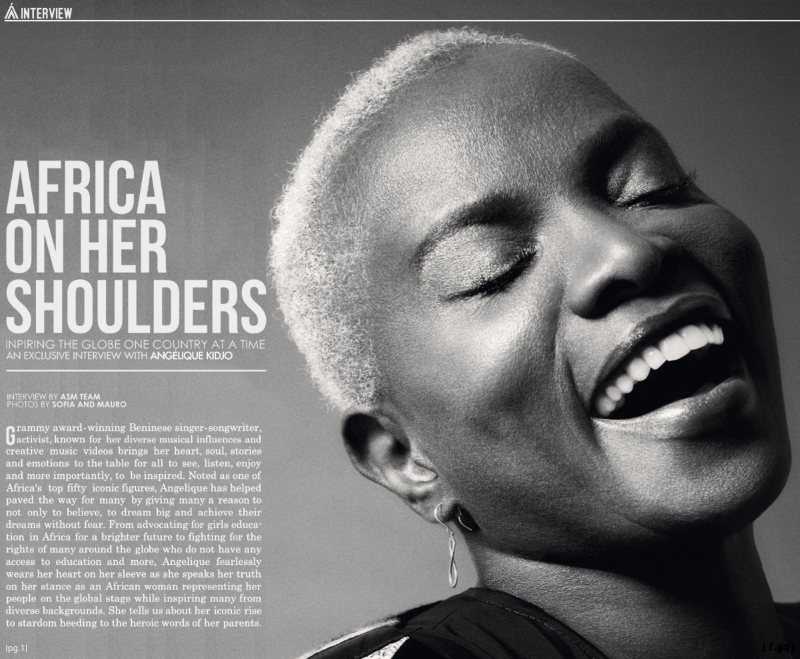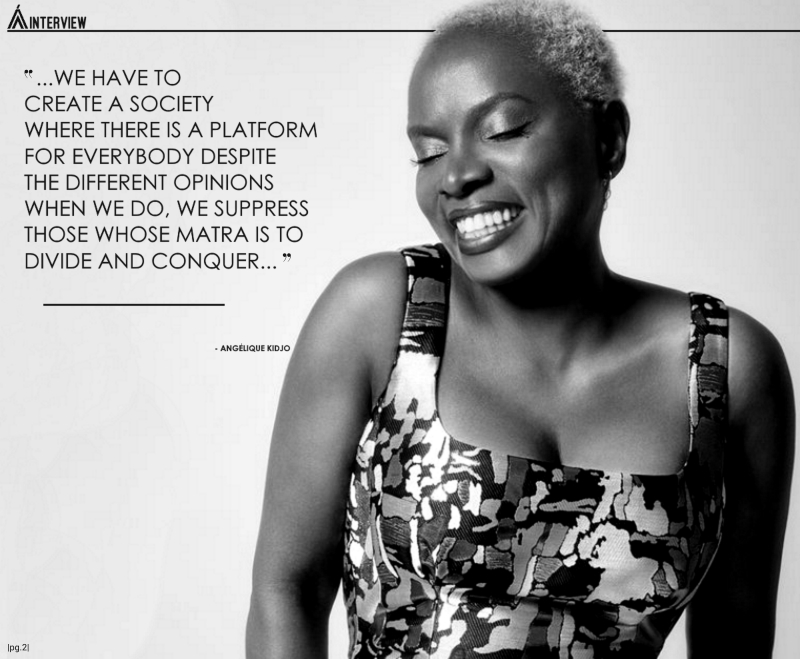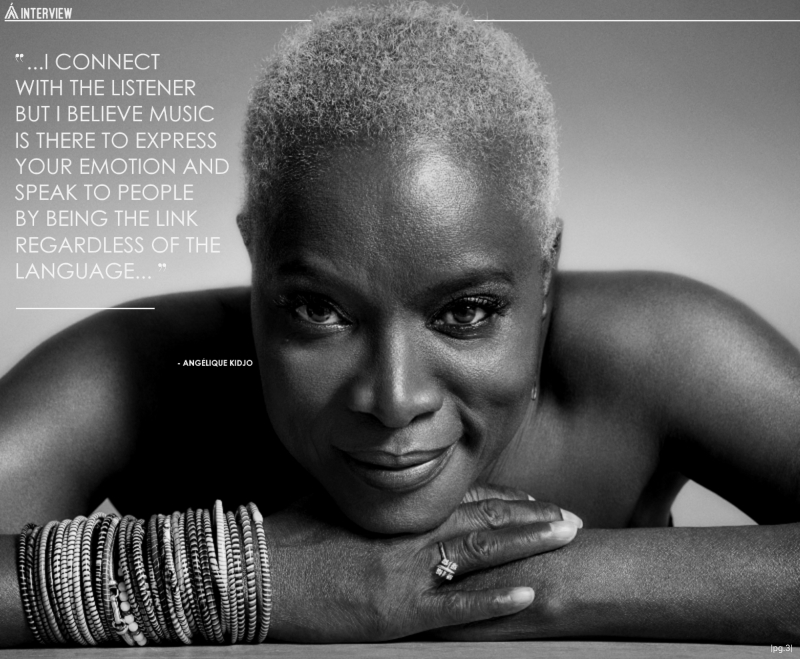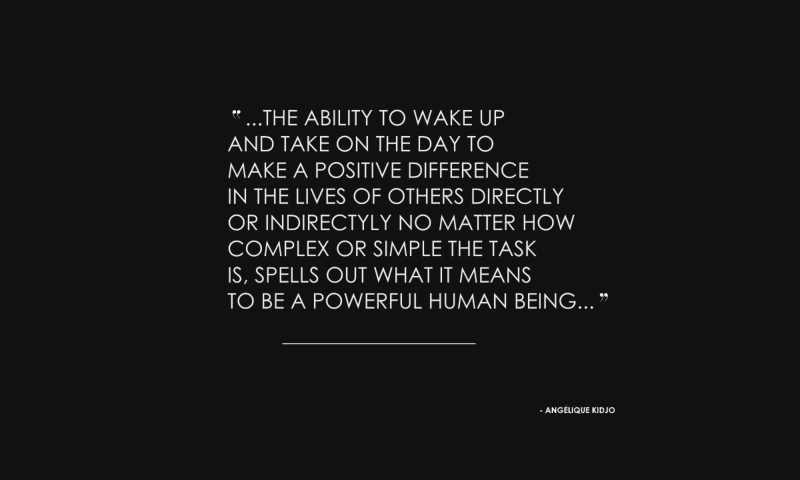





ASM: Your music and energy are transcendent and feel unique in subject matter and tone. Does this come from within or from experiences?
AK: It is both. Growing up, I was always one to ask questions. I loved and still do love spending time with elderly people because I learn from them. From my parents, my grandmother to aunts or strangers, I love asking questions because there is still a lot to know; and furthermore, if there are lingering questions on my mind, I reach out to understand. That is my way of life because I believe things do not happen from outside a person; one experiences life and reacts to it given the lessons learned. It is up to the person to make the right decision - knowing what is right and wrong; and how the decision will affect him or her in the long run. As my father used to tell us, “It is your life and so, you have to figure things out for yourself. Go to school to learn and understand the complexity of the world that we live in; and never think that the world stops at the doorstep of your house. It is simultaneously a big and small world - and we are a part of it." All of this was a part of my life experience and it helped me evolve. So, in everything I do, I try to show what I have been through and learned through my experiences; and how these experiences have made quite an impact in my music and life. It also shows how people have allowed me to be who I am today.
ASM: How do these influences become part of your music? Were there earlier experiences that you wanted to explore or somethings you felt naturally helped you?
AK: I really do not think that way. One thing I learned growing up is when I asked questions, I too was questioned on my inquisitiveness. They would ask if there was a song I have that made me question them. The reason is because, when one writes or sings a song, the listeners immediately feel a connection with the singer because they know that they are not alone and will not be lectured to; moreover, they do not want to feel like their intelligence is being questioned. My music is generally about my own experiences and if people can relate to it, then there is an understanding and comradery. With this connection, we as a global family have a responsibility to counter the hate and make sense of what is going on around us and help make changes for the better in any way we can in order to positively make a difference.
ASM: You are multi-lingual. Have you ever wondered where language comes from and is there a power in being multi-lingual?
AK: I have asked that question. Your question also is based on how one perceives oneself in the world and what one brings to the table. What is it that makes you want to go to bed and wake up to? What are you willing to die for? What is life and what kind of life do you want to lead? Do you want to be a victim or be the participant who encourages and leads others? These are questions we should ask ourselves, but we are so complacent and stay silent most of the time because of the fear of losing everything if we speak out for the greater good and a better society; however, we have nothing yet. In our silence, we lose our rights along with other necessities - and what is more important than our rights.

ASM: When you speak in the different languages, does that change what you think about or does the message stay the same? What makes you choose one language over the other when you sing?
AK: One thing that people do not understand about Africa is that the continent is vast but to survive in a country - from North, South to East and West, you have to know a couple of words of different languages spoken in that country and there are so many of them. In my country, the Republic of Benin, there are more than fifty - five identifiable languages spoken by ten million people. So, knowing some words and sentences go a long way. When it comes to language, which ever I think about, I create my thoughts or words and I just write and sing. In turn, I connect with the listener, but I believe music is there to express your emotion and speak to people by being the link regardless of the language.
ASM: That is interesting. This brings us to the next question. Do you consider yourself an African or a Pan-African?
AK: I was born and raised in the continent of Africa by parents who are from that part of the world. Through both of them along with my inquiring mind, I learned so much about who I am as an African woman. At the same time, my father encouraged me to look beyond my immediate surroundings and learn about the outside world and open my mind to others; whether they look like me or not because we are all human beings. As human beings, we must work together if we want to see changes. I consider myself as a global citizen because I am not afraid of anybody no matter how much power an individual has. At the end of the day, the ability to wake up and take on the day to make a positive difference in the lives of others directly or indirectly no matter how complex or simple the task is, spells out what it means to be a powerful human being. Life is hard and can hurt but work with it because you are in the middle of it; and since anything can happen at any time, be grateful for every waking day. This is what I do because this is who I am.
ASM: You are one few Africans on the global stage using the platform as an Ambassador and via your organization Batonga to bring the much-needed attention to issues such as the importance of education and women's rights. There are racial, tribal, religious divisions around the globe whether people admit it or not. What you do think should be done to propel the much-needed unity that is seriously lacking in order to encourage crossing of borders without fear.
AK: I think that we have to create a society where there is a platform for everybody to be interesting despite the different opinions. We all need to be heard and this should include others with an unpopular point of view. It does not mean we should be complacent in our approach to those we are not in agreement with. It means we are playing our part in breaking the barrier. Remember that everybody does not have to be politically correct, but it is imperative that we use our brain to challenge each other to be better together. This is why education is extremely important now and for generations to come - especially in developing countries in Africa and around the globe. We have to start somewhere no matter how difficult it will be because when we do, we suppress those whose mantra is to divide and conquer.
ASM: When your name is mentioned, there are different words fans use to describe you. What is it about you that people are not aware of? What would you like your legacy to be known for?
AK: I am living my dream, so I would like my legacy always to remind people to dream big, give wings to the dream to come true, and live the dream. As my father used to say, if the dream is not big enough, then do not dream about it. If the initial dream does not come true, have a plan B or C because things change. However, we are human beings who can adapt to change by learning and adjusting. Do not be afraid to get of the bubble and learn about those around you because in doing so, you will find the passion that is in your heart and live out your dream while positively touching the lives of people you come across. My dream has brought me this far to where I am now; but I continue to dream big and should my dream take down another path, I will go because I know that there is something great waiting for me that will enable me to be available to those who may be in need of my service as a global citizen.